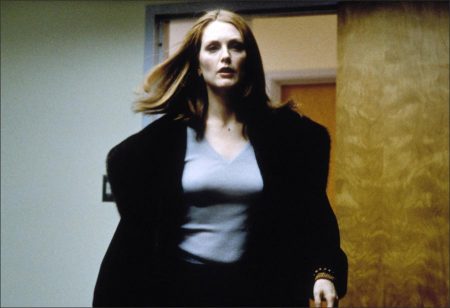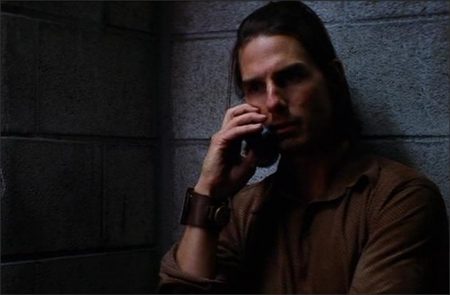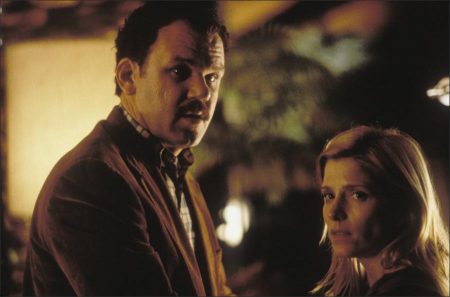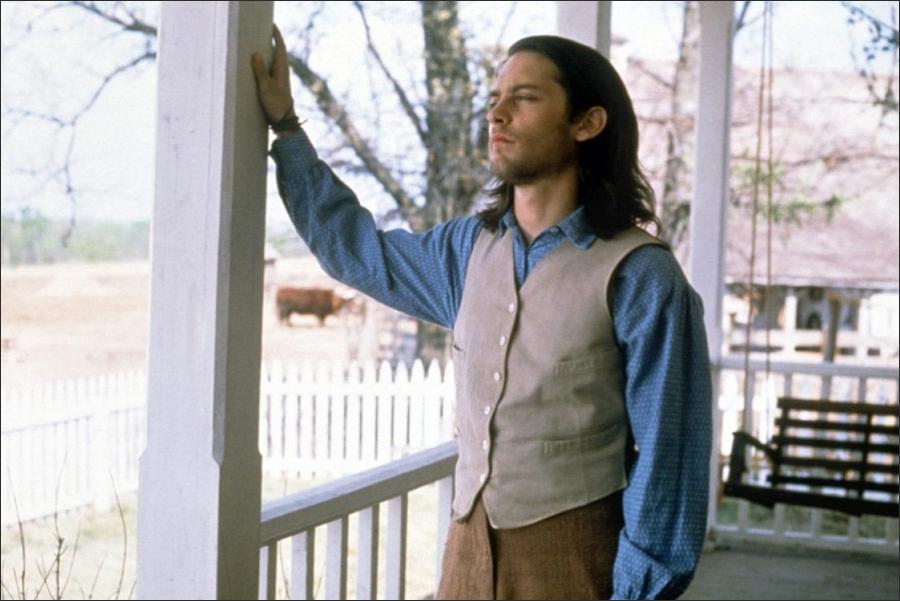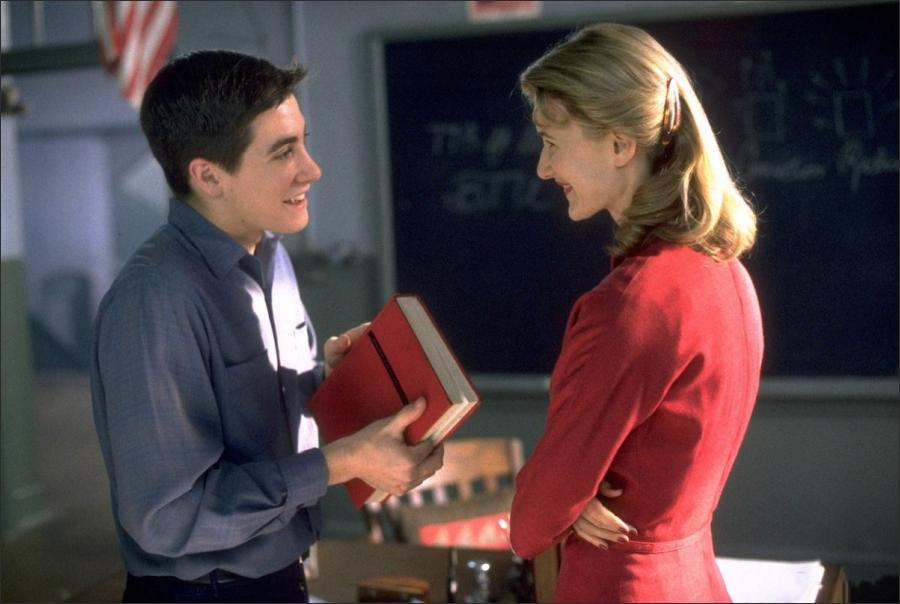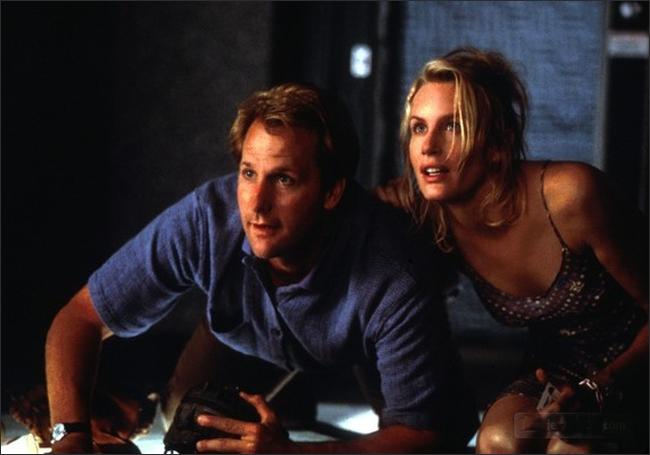Taglines: Things fall down. People look up. And when it rains, it pours.
Magnolia movie storyline. 24 hours in L.A.; it’s raining cats and dogs. Two parallel and intercut stories dramatize men about to die: both are estranged from a grown child, both want to make contact, and neither child wants anything to do with dad. Earl Partridge’s son is a charismatic misogynist; Jimmy Gator’s daughter is a cokehead and waif.
A mild and caring nurse intercedes for Earl, reaching the son; a prayerful and upright beat cop meets the daughter, is attracted to her, and leads her toward a new calm. Meanwhile, guilt consumes Earl’s young wife, while two whiz kids, one grown and a loser and the other young and pressured, face their situations. The weather, too, is quirky.
Magnolia is a 1999 American ensemble drama film written, co-produced and directed by Paul Thomas Anderson. The film stars Jeremy Blackman, Tom Cruise, Melinda Dillon, Philip Baker Hall, Philip Seymour Hoffman, Ricky Jay, William H. Macy, Alfred Molina, Julianne Moore, John C. Reilly, Jason Robards and Melora Walters, and is a mosaic of interrelated characters in search of happiness, forgiveness and meaning in the San Fernando Valley.
Magnolia received positive reviews, with critics praising its acting, direction, storytelling, ambition, and its soundtrack, largely consisting of Aimee Mann songs; however, some deemed it overlong and melodramatic. Of the ensemble cast, Tom Cruise was nominated for Best Supporting Actor at the 72nd Academy Awards, and won the award in that category at the Golden Globes of 2000. The film also won the Golden Bear at the Berlin International Film Festival. It was Robards’ final feature film.
Film Review for Magnolia
The great uh-oh moment in Paul Thomas Anderson’s ”Magnolia” occurs about two-thirds of the way through this artfully orchestrated symphony of L.A. stories. A song bursts out: it is heard first from one character, then from another, until all the film’s assorted lost souls are brought together by a single anxiety-ridden refrain. ”It’s not . . . going to stop,” each one sings resignedly, signaling the approach of an impending group meltdown. But the effect is less that of a collective shiver than of directorial desperation.
Until that point, the colossally talented Mr. Anderson has seemed bound for glory. He has set up another Altmanesque swirl of intersecting stories, much as he did in ”Boogie Nights,” with many of the same cast members again assembled to form a charismatic ensemble. He has glided the film gracefully among seemingly unrelated episodes, keeping the viewer eager for all the pieces to fall into place. And he has begun the film with a paean to outrageously wild twists of fate, so that his own film’s whopper coincidences won’t seem too much of a stretch.
And to the same ”Nashville” echoes that reverberated through ”Boogie Nights,” he now adds a potent touch of ”Network.” In the San Fernando Valley, on the verge of the new millennium, the effects of media poisoning are powerfully felt. From the dying television mogul (Jason Robards) to the schoolboy quiz show star who can’t take any more pressure (Jeremy Blackman), virtually everyone in the film is a casualty of pop cultural malaise in some fashion.
The present day, seen as if from a great distance, appears to have brought the dire warnings of the ”Network” madman Howard Beale to fruition. Stepping into the ”Network” role of soothsayer, Mr. Anderson leaves himself poised to wonder what’s next. But when that group sing-along arrives, ”Magnolia” begins to self-destruct spectacularly. It’s astonishing to see a film begin this brilliantly only to torpedo itself in its final hour.
All along, Mr. Anderson has leapt from episode to episode as if working under the spell of some larger vision. But as the desperate reach for some larger meaning begins, the sheer arbitrariness of his approach is laid bare. So bare, in fact, that when ”Magnolia” finally does come in for what is quite literally an amphibious landing, it actually invokes a biblical plague to create a sense of resolution. Even in the Bible, that kind of maneuver was a last resort.
Named for, among other things, a thoroughfare in Mr. Anderson’s native San Fernando Valley, and conceived with a many-petaled structure, ”Magnolia” is still too good to be missed. What Mr. Anderson lacks in substance is offset by his great skill with actors, his gift for shaping resonant little individual vignettes and his extraordinary intuition. Treated in linear fashion, the events and relationships here would not add up to much. But scrambled and rearranged as a haunting collage, they take on greater power.
At the very least, ”Magnolia” is a showcase for some splendid acting. Its single biggest surprise is Tom Cruise in the role of a strutting, obscenity-spouting cult figure named Frank Mackey. Frank’s brand of celebrity as a macho self-help guru is seen as symptomatic of the film’s time and place. First seen in performance, on a kind of rock-star high, Frank is later made to unravel during a lengthy interview sequence (with April Grace) that is one of the film’s incisive highlights.
With a keen sense of the nuances and power plays involved here, Mr. Anderson creates a sustained trial by fire for Frank and shows how each of the film’s initially secure-seeming characters is actually so vulnerable and needy. Mr. Cruise, like the other actors here, is allowed to come on like gangbusters and then reveal hidden uncertainty until, in that lethal last hour, the film’s startlingly vapid insights lead him off a cliff.
Mr. Anderson, who uses Aimee Mann’s songs on the soundtrack to excellent effect, has acknowledged drawing inspiration for the film’s mood and structure from Beatles music (with pervasive, brewing mood changes that share the unsettling spirit of ”A Day in the Life”). Thus he often seems to be conducting the ways in which characters meet and intersect.
It is gradually revealed, for instance, that the film includes not only its young quiz show star but a former boy wonder (William H. Macy) who is now a sad has-been. And that two of the story’s older men (Mr. Robards and Philip Baker Hall) are powerful figures in the television industry who have serious illnesses and bitterly estranged children. Julianne Moore wafts luminously through the film as the grieving wife of one of them, a figure of showy materialism with no inner resources at all. ”Magnolia” is saved from its own worst, most reductive ideas by the intimacy of the performances and the deeply felt distress signals given off by the cast.
Also extremely memorable here are two other members of Mr. Anderson’s evolving stock company, Philip Seymour Hoffman as a dying man’s devoted nurse and caretaker and John C. Reilly as an equally compassionate policeman. In each of them there is the mixture of creeping despair and saving grace that are the best ”Magnolia” has to offer.
Magnolia (1999)
Directed by: Paul Thomas Anderson
Starring: Tom Cruise, Melinda Dillon, Philip Baker Hall, Philip Seymour Hoffman, Jeremy Blackman, Ricky Jay, William H. Macy, Alfred Molina, Julianne Moore, John C. Reilly, Jason Robards, Melora Walters
Screenplay by: Paul Thomas Anderson
Production Design by: William Arnold, Mark Bridges
Cinematography by: Robert Elswit
Film Editing by: Dylan Tichenor
Costume Design by: Mark Bridges
Set Decoration by: Chris L. Spellman
Music by: Jon Brion
MPAA Rating: R for strong language, drug use, sexuality and some violence.
Distributed by: New Line Cinema
Release Date: December 17, 1999
Views: 185
